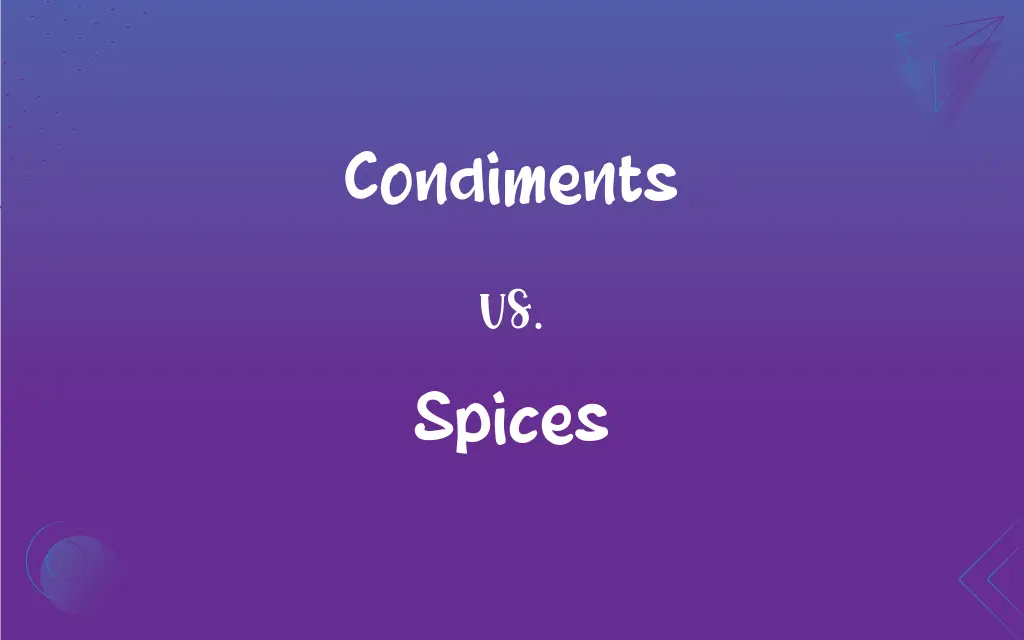Condiments vs. Spices: What's the Difference?
Edited by Janet White || By Harlon Moss || Updated on October 5, 2023
Condiments are substances added to food for flavoring or complementing, often after cooking, while spices are aromatic or pungent substances used to season food during preparation or cooking.

Key Differences
Condiments encompass a broad range of substances that are typically added to food to enhance or complement its flavor. These can be sauces, relishes, or spreads that are often added post-cooking, right before consumption. Spices, conversely, are primarily aromatic or pungent substances derived from plants and are used to season or flavor foods, most commonly during the cooking process.
While condiments can be standalone items like ketchup, mayonnaise, or mustard, spices often come from specific parts of plants like seeds, bark, or roots. The primary intention of spices, such as cinnamon, cumin, or pepper, is to infuse food with particular flavors or aromas during its preparation. Condiments, on the other hand, give consumers a choice to further adjust or complement a dish's flavor according to their preference.
It's also notable how condiments and spices are stored and presented. Condiments usually come in bottles, jars, or squeeze tubes and are often refrigerated after opening. Spices, however, are generally found in dried form and stored in small jars or containers in a pantry or spice rack.
Regionally, condiments can vary dramatically, with different cultures favoring distinct sauces or additions to their food. Spices, though universal in their use, can be particularly synonymous with certain cuisines – like how Indian cuisine is known for its rich use of a variety of spices.
Comparison Chart
Definition
Substances added to food post-cooking
Aromatic or pungent substances added during cooking
ADVERTISEMENT
Source
Various, often processed
Specific plant parts like seeds, bark, or roots
Storage
Typically in bottles or jars; often refrigerated
In jars or containers; usually at room temperature
Use in Cooking
Mostly after cooking
Primarily during cooking
Regional Variation
Can vary dramatically by culture
Universal but may be synonymous with certain cuisines
Condiments and Spices Definitions
Condiments
Edible products that complement food items.
Pickles are condiments that pair well with many meals.
ADVERTISEMENT
Spices
Pungent additions to recipes.
Adding black pepper, a common spice, gives a kick to dishes.
Condiments
Additions that personalize a dish's taste.
Hot sauce is a spicy condiment favored by many.
Spices
Ingredients added during food preparation.
Using the right spices can elevate any dish.
Condiments
Sauces or spreads used with dishes.
Mayonnaise is a condiment often used in sandwiches.
Spices
Aromatic substances used for seasoning.
Cinnamon and nutmeg are spices used in baking.
Condiments
Substances added to food to enhance flavor.
Ketchup and mustard are popular condiments for hot dogs.
Spices
Dried plant parts enhancing food flavor.
The curry was rich with a blend of spices.
Condiments
Flavorings added to food post-cooking.
Relish is a condiment commonly added to sausages.
Spices
Natural flavorings from plants.
Turmeric is a spice known for its vibrant color and health properties.
Spices
Any of various pungent, aromatic plant substances, such as cinnamon or nutmeg, used to flavor foods or beverages.
Spices
These substances considered as a group.
Spices
Something that adds zest or interest
The controversy added spice to the political campaign.
Spices
A pungent aroma.
Spices
To season with spices.
Spices
To add zest or interest to
Uses witty rhymes to spice up the song.
Spices
Plural of spice
FAQs
What are condiments primarily used for?
Condiments enhance or complement food flavors, often post-cooking.
When are spices typically added to food?
Spices are generally added during food preparation or cooking.
Are all condiments liquid?
No, condiments can be liquid, semi-solid, or solid (like relishes).
Which is added after cooking: condiments or spices?
Condiments are typically added after cooking.
How are condiments typically stored?
Condiments are usually stored in bottles or jars and often refrigerated.
Are herbs and spices the same?
No, herbs are typically the green, leafy parts of plants, while spices come from other parts.
Are all spices dried?
While commonly dried for longevity, spices can be used fresh in some recipes.
Why are spices important in cooking?
Spices enhance, balance, and bring complexity to the flavors in food.
Is salt considered a spice?
While used like a spice, salt is technically a mineral and not derived from plants.
Can condiments be made from spices?
Yes, some condiments are spice-based, like mustard.
Can condiments be spicy?
Yes, some condiments, like hot sauces, are spicy.
Can condiments be homemade?
Yes, many people make homemade condiments like sauces and relishes.
Are spices used in beverages?
Yes, spices like cinnamon or cloves can be used in beverages.
Are spices always hot or pungent?
No, spices can range from sweet to hot, depending on their nature.
Which is more associated with specific cuisines: condiments or spices?
Both can be, but spices are often more synonymous with particular cuisines.
Which cuisine is known for its use of spices?
Indian cuisine is particularly known for its rich spice use.
From where are spices derived?
Spices come from specific plant parts like seeds, bark, or roots.
Is soy sauce a spice or a condiment?
Soy sauce is a condiment.
Do condiments have a long shelf life?
Most condiments have a longer shelf life, especially when refrigerated.
How are spices typically sold?
Spices are usually sold dried and in jars or packets.
About Author
Written by
Harlon MossHarlon is a seasoned quality moderator and accomplished content writer for Difference Wiki. An alumnus of the prestigious University of California, he earned his degree in Computer Science. Leveraging his academic background, Harlon brings a meticulous and informed perspective to his work, ensuring content accuracy and excellence.
Edited by
Janet WhiteJanet White has been an esteemed writer and blogger for Difference Wiki. Holding a Master's degree in Science and Medical Journalism from the prestigious Boston University, she has consistently demonstrated her expertise and passion for her field. When she's not immersed in her work, Janet relishes her time exercising, delving into a good book, and cherishing moments with friends and family.































































